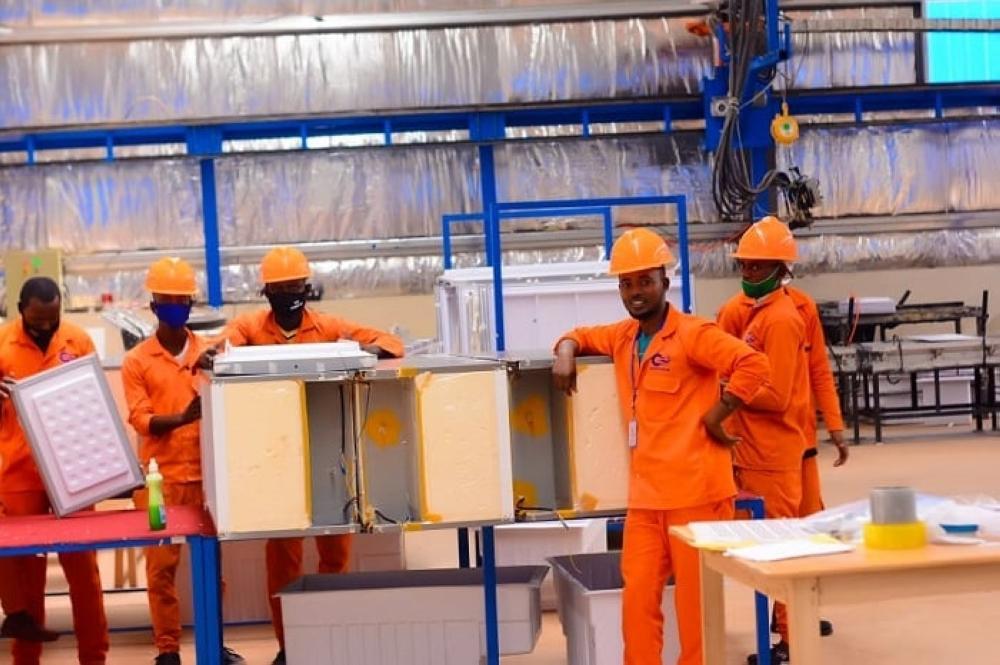Africa-Press – Rwanda. Imported and locally manufactured refrigeration equipment will soon be tested and certified for energy efficiency in Rwanda, The New Times has learnt.
Inefficient refrigerators currently waste electricity worth an estimated Rwf4 billion annually. Such appliances consume more power, cost more to operate, and contribute to higher greenhouse gas emissions due to outdated designs or refrigerants.
Refrigeration equipment includes household and commercial fridges, freezers, cold rooms, chillers used in industries, refrigerated trucks for transporting perishables, and air conditioners—all of which are part of the broader cooling ecosystem.
Experts are urging consumers to adopt energy-saving refrigerators and air conditioners to cut costs and reduce environmental impact.
According to available data, Rwanda has 87,512 refrigerators, of which about 64,505 are considered old and inefficient.
Testing facility to ensure standards compliance
Prof. Toby Peters, Professor of Cold Economy at the University of Birmingham and Founding Director of the Africa Centre of Excellence for Sustainable Cooling and Cold-chain (ACES) in Kigali, said the centre has established an environmental test chamber to assess the energy efficiency of refrigeration equipment.
“We’ve just built an environmental test chamber. With this facility, we can now test refrigeration equipment in Rwanda, for Rwanda,” he said. “This ensures that both imported and locally made equipment meet national efficiency standards protecting consumers while safeguarding the environment.”
He noted that the centre has secured more than $50 million in funding for the programme from both government and industry.
“The Government of Rwanda has provided land and facilities, and we also have access to a 200-hectare research farm. Altogether, including in-kind contributions, the investment exceeds $50 million,” he added.
Festival of Cooling: advancing climate-friendly solutions
The new facility was showcased during the Festival of Cooling, held from October 6–10, which focused on sustainable cooling technologies for agriculture, health, and climate resilience.
The centre receives financial support from the UK and Rwandan governments.
“We’ve welcomed ministers from both countries, who were eager to see how our work aligns with Rwanda’s national vision—empowering farmers, reducing food loss, creating jobs, and promoting opportunities for youth and women,” Prof. Peters said.
UK Minister for International Development Baroness Chapman joined Rwanda’s Ministers of Environment and Agriculture in touring the facility.
Tackling food and vaccine waste
The cooling systems—mainly fridges and cold rooms—promoted by ACES aim to reduce post-harvest losses and protect perishable goods. Across Africa, up to 40% of food is lost post-harvest due to a lack of cold storage, while 25–50% of vaccines spoil because of improper storage.
During the Festival of Cooling, farmers participated in hands-on training sessions on sustainable cooling solutions, such as solar-powered cold rooms, pre-cooling units, and temperature monitoring tools.
They also explored innovative financing models, including leasing, pay-as-you-store, and cooling-as-a-service, to make the technology more accessible.
Farmers shared experiences and success stories.
“As a farmer, after exploring the different cooling solutions, I realised we have several options to tackle post-harvest losses,” said Marie Claire Umubyeyi from Rwamagana District.
“I met others using solar-powered cold rooms—essential in rural areas without access to the national grid. We hope ACES will support more farmers.”
Claudine Niragire, a fruit and vegetable exporter, added:
“We store our produce in cold rooms where it stays fresh until we find buyers. Even during the dry season, our harvests remain intact thanks to these facilities.”
Private sector innovations driving expansion
Startups are also investing in cold chain solutions. Marie Rose Sabina, Founder of Green Energy Technology Ltd (GET), said her company is seeking to raise $500,000 to expand operations.
“With that, we could acquire refrigerated trucks, build three cold rooms at agri-hubs—each with a five-tonne capacity—and expand our team,” she said.
Patrick Ndayisaba, Founder of Greenover Africa, said his solar-powered cooling system helps smallholder farmers in off-grid areas reduce post-harvest losses.
“We’ve developed a working prototype and are now seeking partners to help us scale up,” he said.
National targets to cut food losses
Telesphore Ndabamenye, Minister of State for Agriculture and Animal Resources, emphasised that accelerating the uptake of cooling technologies is central to achieving national food security goals.
Florence Uwamahoro, Deputy Director General in charge of Agricultural Development at RAB, said Rwanda aims to cut post-harvest losses in staple crops from 13.8 percent in 2023 to 8 percent by 2029, alongside reducing spoilage in fruits and vegetables.
A 2023 RAB study found substantial losses across key value chains: maize (13.8%), beans (11.3%), rice (12.4%), tomatoes (33.5%), cassava (24.8%), and Irish potatoes (25.2%).
For More News And Analysis About Rwanda Follow Africa-Press






